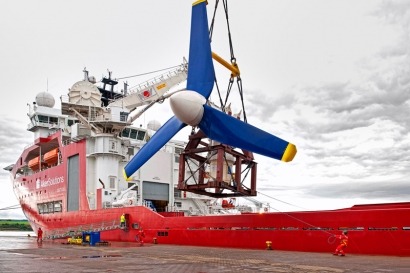
The Tidal Energy Converter (TEC) System Demonstrator project will adopt a system and through-life approach to identify, develop and prove the best routes and supply-chain options to commercially viable tidal stream technologies when deployed at array scale.
The project, awarded to a team led by Atlantis Resources Corporation, will run over two phases, with funding released in stages according to the progress achieved.
Speaking in Aberdeen, the Minister said: ”Reducing costs to levels comparable to other low carbon systems is critical in accelerating the development and commercialisation of Tidal Energy Converter device arrays. This is part of a co-ordinated programme of public sector support to innovation in marine energy which is expected to exceed £80 million over the next few years.”
Extracting energy from the very significant tidal stream resources around the UK coast using TECs could play an important part in delivering sustainable, low-cost electricity to UK consumers in the future. However, the cost and performance of today’s systems needs to improve significantly in order to attract large scale project investment and to deliver meaningful UK deployment levels.
“For tidal technologies to be deployed at a commercially viable scale, array level system design needs to be addressed and supported with improvements in a wide range of supply-chain and infrastructure issues, including technology selection, subsea systems, on-shore electrical grid connection and device installation and operation,” explains David Clarke, ETI Chief Executive. “This project aims to identify routes to cost effective installation and operation of tidal stream technologies in UK waters. Reducing costs to levels comparable to other low carbon systems is critical in accelerating the development and commercialisation of TEC device arrays.”
The first phase of the project, which will run over 16 months, will see the ETI invest up to £3.2 million. It will be project managed by Black & Veatch and will draw extensively on the systems integration and technology skills of Lockheed Martin, as well as several leading technology providers across the marine industry including Atlantis, an international marine energy company which is testing its latest turbine, the 1MW AR1000, at the EMEC facility in Scotland and the Narec facility in England.
Cost of energy targets
The initial part of phase one of the TEC System Demonstrator project will see the ETI invest £1.75 million and will assess a variety of system configurations and potential technology choices to identify the best options for meeting the cost of energy targets defined in the ETI / UKERC Marine Energy Technology Roadmap published in 2010. If a clear path can be seen to achieving these cost of energy targets, then phase one will continue to develop the most promising innovations and architecture in readiness for demonstration.
If successful, the project will progress to a second phase, at an estimated cost of £10 million, during which the system and sub-system solutions will be developed towards commercial readiness and the system demonstrated in a realistic offshore environment. Phase Two will take approximately three years.
“The TEC System Demonstrator project will play an important part in helping the UK tidal energy industry fulfil its role in the UK’s future energy mix. It will focus the efforts of the sector’s leading technology providers, developers and researchers on the core task of rapid and meaningful cost of energy reduction,” concludes Tim Cornelius, Atlantis CEO. Together with its partners, Atlantis is developing some of the world’s first tidal power generation sites, in the Pentland Firth, Scotland, the gulfs of Khambhat and Kutch in Gujarat, India, and at the Fundy Ocean Research Center for Energy, Nova Scotia.
The Energy Technologies Institute is a public-private partnership between global industries – BP, Caterpillar, EDF, E.ON, Rolls-Royce and Shell – and the UK Government.
For additional information:

